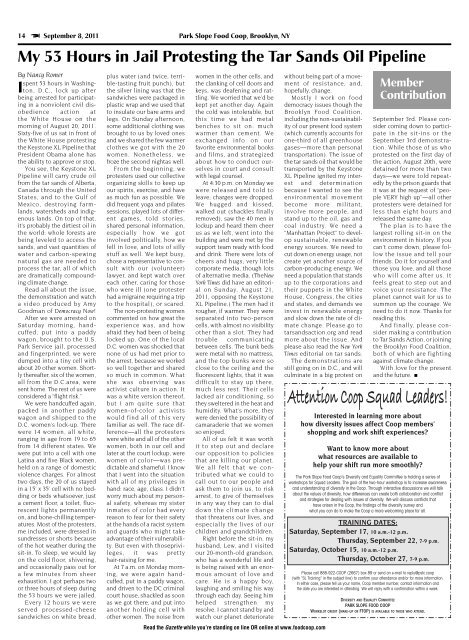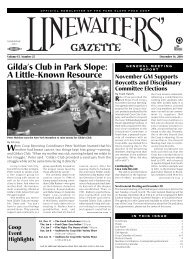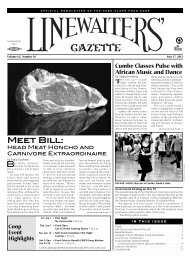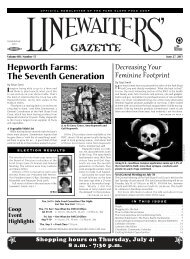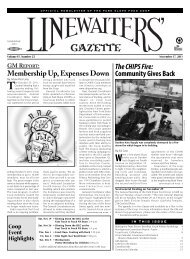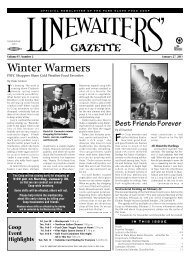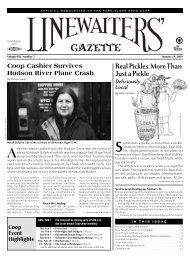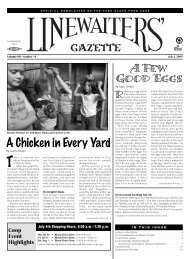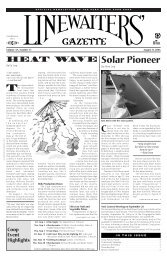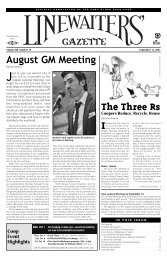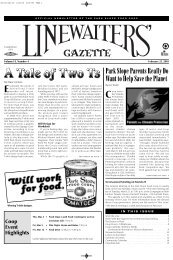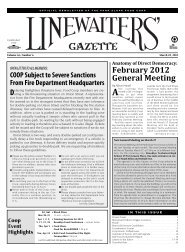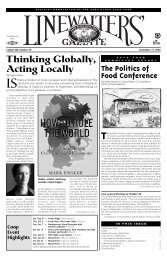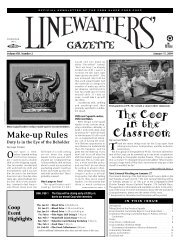September 8th, 2011 : Volume FF, Number 18 - Park Slope Food Coop
September 8th, 2011 : Volume FF, Number 18 - Park Slope Food Coop
September 8th, 2011 : Volume FF, Number 18 - Park Slope Food Coop
Create successful ePaper yourself
Turn your PDF publications into a flip-book with our unique Google optimized e-Paper software.
11-09-08.pp1-16.gazette_Layout 1 9/7/11 7:27 PM Page 14<br />
14 <strong>September</strong> 8, <strong>2011</strong> <strong>Park</strong> <strong>Slope</strong> <strong>Food</strong> <strong>Coop</strong>, Brooklyn, NY<br />
My 53 Hours in Jail Protesting the Tar Sands Oil Pipeline<br />
By Nancy Romer<br />
Ispent 53 hours in Washington,<br />
D.C., lock up after<br />
being arrested for participating<br />
in a nonviolent civil disobedience<br />
action at<br />
the White House on the<br />
morning of August 20, <strong>2011</strong>.<br />
Sixty-five of us sat in front of<br />
the White House protesting<br />
the Keystone XL Pipeline that<br />
President Obama alone has<br />
the ability to approve or stop.<br />
You see, the Keystone XL<br />
Pipeline will carry crude oil<br />
from the tar sands of Alberta,<br />
Canada through the United<br />
States, and to the Gulf of<br />
Mexico, destroying farmlands,<br />
watersheds and indig -<br />
enous lands. On top of that,<br />
it’s probably the dirtiest oil in<br />
the world: whole forests are<br />
being leveled to access the<br />
sands, and vast quantities of<br />
water and carbon-spewing<br />
natural gas are needed to<br />
process the tar, all of which<br />
are dramatically compounding<br />
climate change.<br />
Read all about the issue,<br />
the demonstration and watch<br />
a video produced by Amy<br />
Goodman of Democracy Now!<br />
After we were arrested on<br />
Saturday morning, handcuffed,<br />
put into a paddy<br />
wagon, brought to the U.S.<br />
<strong>Park</strong> Service jail, processed<br />
and fingerprinted, we were<br />
dumped into a tiny cell with<br />
about 20 other women. Shortly<br />
thereafter, six of the women,<br />
all from the D.C.area, were<br />
sent home. The rest of us were<br />
considered a “flight risk.”<br />
We were handcuffed again,<br />
packed in another paddy<br />
wagon and shipped to the<br />
D.C. women’s lock-up. There<br />
were 14 women, all white,<br />
ranging in age from 19 to 65<br />
from 14 different states. We<br />
were put into a cell with one<br />
Latina and five Black women,<br />
held on a range of domestic<br />
violence charges. For almost<br />
two days, the 20 of us stayed<br />
in a 15’ x 35’ cell with no bedding<br />
or beds whatsoever, just<br />
a cement floor, a toilet, fluorescent<br />
lights permanently<br />
on, and bone-chilling temperatures.<br />
Most of the protesters,<br />
me included, were dressed in<br />
sundresses or shorts because<br />
of the hot weather during the<br />
sit-in. To sleep, we would lay<br />
on the cold floor, shivering,<br />
and occasionally pass out for<br />
a few minutes from sheer<br />
exhaustion. I got perhaps two<br />
or three hours of sleep during<br />
the 53 hours we were jailed.<br />
Every 12 hours we were<br />
served processed-cheese<br />
sandwiches on white bread,<br />
plus water (and twice, terrible-tasting<br />
fruit punch), but<br />
the silver lining was that the<br />
sandwiches were packaged in<br />
plastic wrap and we used that<br />
to insulate our bare arms and<br />
legs. On Sunday afternoon,<br />
some additional clothing was<br />
brought to us by loved ones<br />
and we shared the few warmer<br />
clothes we got with the 20<br />
women. Nonetheless, we<br />
froze the second nightas well.<br />
From the beginning, we<br />
protesters used our collective<br />
organizing skills to keep up<br />
our spirits, exercise, and have<br />
as much fun as possible. We<br />
did frequent yoga and pilates<br />
sessions, played lots of different<br />
games, told stories,<br />
shared personal information,<br />
especially how we got<br />
involved politically, how we<br />
fell in love, and lots of silly<br />
stuff as well. We kept busy,<br />
chose a representative to consult<br />
with our (volunteer)<br />
lawyer, and kept watch over<br />
each other, caring for those<br />
who were ill (one protester<br />
had a migraine requiring a trip<br />
to the hospital), or scared.<br />
The non-protesting women<br />
commented on how great the<br />
experience was, and how<br />
afraid they had been of being<br />
locked up. One of the local<br />
D.C. women was shocked that<br />
none of us had met prior to<br />
the arrest, because we worked<br />
so well together and shared<br />
so much in common. What<br />
she was observing was<br />
activist culture in action. It<br />
was a white version thereof,<br />
but I am quite sure that<br />
women-of-color activists<br />
would find all of this very<br />
familiar as well. The race difference—all<br />
the protesters<br />
were white and all of the other<br />
women, both in our cell and<br />
later at the court lockup, were<br />
women of color—was predictable<br />
and shameful. I know<br />
that I went into the situation<br />
with all of my privileges in<br />
hand: race, age, class. I didn’t<br />
worry much about my personal<br />
safety, whereas my sister<br />
inmates of color had every<br />
reason to fear for their safety<br />
at the hands of a racist system<br />
and guards who might take<br />
advantage of their vulnerability.<br />
But even with thoseprivileges,<br />
it was pretty<br />
hair-raising for me.<br />
At 7 a.m. on Monday morning,<br />
we were again handcuffed,<br />
put in a paddy wagon,<br />
and driven to the DC criminal<br />
court house, shackled as soon<br />
as we got there, and put into<br />
another holding cell with<br />
other women. The noise from<br />
women in the other cells, and<br />
the clanking of cell doors and<br />
keys, was deafening and rattling.<br />
We worried that we’d be<br />
kept yet another day. Again<br />
the cold was intolerable, but<br />
this time we had metal<br />
benches to sit on: much<br />
warmer than cement. We<br />
exchanged info on our<br />
favorite environmental books<br />
and films, and strategized<br />
about how to conduct ourselves<br />
in court and consult<br />
with legal counsel.<br />
At 4:30 p.m. on Monday we<br />
were released and told to<br />
leave; charges were dropped.<br />
We hugged and kissed,<br />
walked out (shackles finally<br />
removed), saw the 40 men in<br />
lockup and heard them cheer<br />
us as we left, went into the<br />
building and were met by the<br />
support team ready with food<br />
and drink. There were lots of<br />
cheers and hugs, very little<br />
corporate media, though lots<br />
of alternative media. (TheNew<br />
York Times did have an editorial<br />
on Sunday, August 21,<br />
<strong>2011</strong>, opposing the Keystone<br />
XL Pipeline.) The men had it<br />
rougher, if warmer. They were<br />
separated into two-person<br />
cells, with almost no visibility<br />
other than a slot. They had<br />
trouble communicating<br />
between cells. The bunk beds<br />
were metal with no mattress,<br />
and the top bunks were so<br />
close to the ceiling and the<br />
fluorescent lights, that it was<br />
difficult to stay up there,<br />
much less rest. Their cells<br />
lacked air conditioning, so<br />
they sweltered in the heat and<br />
humidity. What’s more, they<br />
were denied the possibility of<br />
camaraderie that we women<br />
so enjoyed.<br />
All of us felt it was worth<br />
it to step out and declare<br />
our opposition to policies<br />
that are killing our planet.<br />
We all felt that we contributed<br />
what we could to<br />
call out to our people and<br />
ask them to join us, to risk<br />
arrest, to give of themselves<br />
in any way they can to dial<br />
down the climate change<br />
that threatens our lives, and<br />
especially the lives of our<br />
children and grand children.<br />
Right before the sit-in, my<br />
husband, Lew, and I visited<br />
our 20-month-old grandson,<br />
who has a wonderful life and<br />
is being raised with an enormous<br />
amount of love and<br />
care. He is a happy boy,<br />
laughing and smiling his way<br />
through each day. Seeing him<br />
helped strengthen my<br />
resolve. I cannot stand by and<br />
watch our planet deteriorate<br />
without being part of a movement<br />
of resistance, and,<br />
hopefully, change.<br />
Mostly I work on food<br />
democracy issues though the<br />
Brooklyn <strong>Food</strong> Coalition,<br />
including the non-sustainability<br />
of our present food system<br />
(which currently accounts for<br />
one-third of all greenhouse<br />
gases—more than personal<br />
transportation). The issue of<br />
the tar sands oil that would be<br />
transported by the Keystone<br />
XL Pipeline ignited my interest<br />
and determination<br />
because I wanted to see the<br />
environmental movement<br />
become more militant,<br />
involve more people, and<br />
stand up to the oil, gas and<br />
coal industry. We need a<br />
“Manhattan Project” to develop<br />
sustainable, renewable<br />
energy sources. We need to<br />
cut down on energy usage, not<br />
create yet another source of<br />
carbon-producing energy. We<br />
need a population that stands<br />
up to the corporations and<br />
their puppets in the White<br />
House, Congress, the cities<br />
and states, and demands we<br />
invest in renewable energy<br />
and slow down the rate of climate<br />
change. Please go to<br />
tarsandsaction.org and read<br />
more about the issue. And<br />
please also read the New York<br />
Times editorial on tar sands.<br />
The demonstrations are<br />
still going on in D.C., and will<br />
culminate in a big protest on<br />
Read the Gazette while you’re standing on line OR online at www.foodcoop.com<br />
Member<br />
Contribution<br />
<strong>September</strong> 3rd. Please consider<br />
coming down to participate<br />
in the sit-ins or the<br />
<strong>September</strong> 3rd demonstration.<br />
While those of us who<br />
protested on the first day of<br />
the action, August 20th, were<br />
detained for more than two<br />
days—we were told repeat -<br />
edly by the prison guards that<br />
it was at the request of “people<br />
VERY high up”—all other<br />
protesters were detained for<br />
less than eight hours and<br />
released the same day.<br />
The plan is to have the<br />
largest rolling sit-in on the<br />
environment in history. If you<br />
can’t come down, please follow<br />
the issue and tell your<br />
friends. Do it for yourself and<br />
those you love, and all those<br />
who will come after us. It<br />
feels great to step out and<br />
voice your resistance. The<br />
planet cannot wait for us to<br />
summon up the courage. We<br />
need to do it now. Thanks for<br />
reading this.<br />
And finally, please con -<br />
sider making a contribution<br />
to Tar Sands Action, or joining<br />
the Brooklyn <strong>Food</strong> Coalition,<br />
both of which are fighting<br />
against climate change.<br />
With love for the present<br />
and the future. ■<br />
Interested in learning more about<br />
how diversity issues affect <strong>Coop</strong> members’<br />
shopping and work shift experiences<br />
Want to know more about<br />
what resources are available to<br />
help your shift run more smoothly<br />
The <strong>Park</strong> <strong>Slope</strong> <strong>Food</strong> <strong>Coop</strong>’s Diversity and Equality Committee is holding a series of<br />
workshops for Squad Leaders. The goal of the two-hour workshop is to increase awareness<br />
and understanding of diversity in the <strong>Coop</strong>. Through interactive discussions we will talk<br />
about the values of diversity, how differences can create both collaboration and conflict<br />
and strategies for dealing with issues of diversity. We will discuss conflicts that<br />
have arisen in the <strong>Coop</strong>, the findings of the diversity survey and<br />
what you can do to make the <strong>Coop</strong> a more welcoming place for all.<br />
TRAINING DATES:<br />
Saturday, <strong>September</strong> 17, 10 a.m.-12 p.m.<br />
Thursday, <strong>September</strong> 22, 7-9 p.m.<br />
Saturday, October 15, 10 a.m.-12 p.m.<br />
Thursday, October 27, 7-9 p.m.<br />
Please call 888-922-COOP (2667) box 89 or send an e-mail to reply@psfc.coop<br />
(with “SL Training” in the subject line) to confirm your attendance and/or for more information.<br />
In either case, please tell us your name, <strong>Coop</strong> member number, contact information and<br />
the date you are interested in attending. We will reply with a confirmation within a week.<br />
DIVERSITY AND EQUALITY COMMITTEE<br />
PARK SLOPE FOOD COOP<br />
WORKSLOT CREDIT (MAKE-UP OR FTOP) IS AVAILABLE TO THOSE WHO ATTEND.


